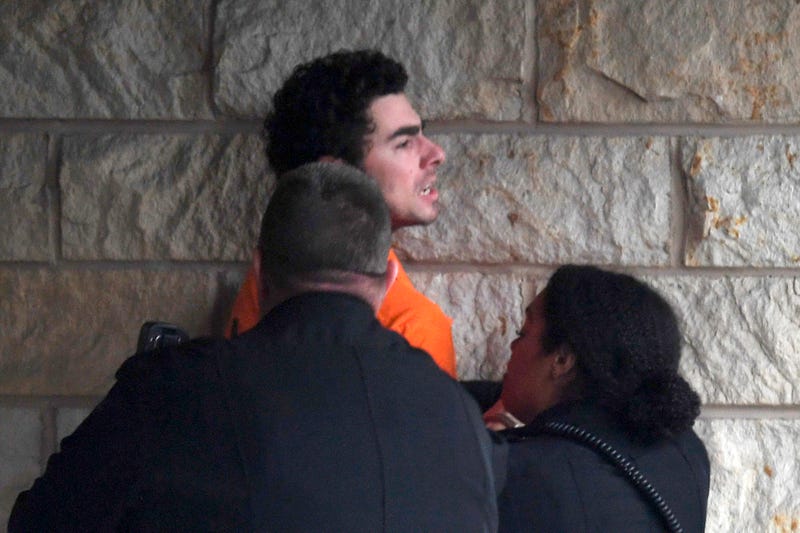
PHILADELPHIA (KYW Newsradio/ AP) — A professor at the University of Pennsylvania has apologized for comments she made online in support of Luigi Mangione, the 26-year-old Penn grad who was charged earlier this week with killing UnitedHealthcare CEO Brian Thompson in Manhattan.
In an Instagram post this week, Julia Alekseyeva, an assistant professor of English and cinema and media studies, called Mangione the “icon we all need and deserve.”
She also posted on her TikTok account, “I have never been prouder to be a professor at the University of Pennsylvania.” Her TikTok account has since been deleted and her Instagram is set to private.
She issued an apology on X, saying the posts were “completely insensitive and inappropriate, and I retract them wholly. I do not condone violence and I am genuinely regretful of any harm the posts have caused.”
A spokesperson for Penn said the university does not condone her comments and the school welcomes her apology.
Others laud Mangione as hero
About the same time the #FreeLuigi memes featuring the mustachioed plumber from “Super Mario Brothers” mushroomed online this week, commenters shared memes showing Tony Soprano pronouncing Mangione a hero. There were the posts lionizing his physique and appearance, the ones speculating about who could play him on “Saturday Night Live,” and the ones denouncing and even threatening people at a Pennsylvania McDonald’s for spotting him and calling police.
It was all too much for Pennsylvania's governor, a rising Democrat who was nearly the vice presidential nominee this year. Josh Shapiro — who was dealing with a case somewhere else that happened to land in his lap — decried what he saw as growing support for “vigilante justice.”
As with so many American events at this moment in the 21st century, the curious case of Brian Thompson and Luigi Mangione has both captivated and polarized a media-saturated nation.
The saga offers a glimpse into how, in a connected world, so many different aspects of modern American life can be surreally linked — from public violence to politics, from health care to humor (or attempts at it).
And it summons a question, too: How can so many people consider someone a hero when the rules that govern American society — the law — are treating him as the complete opposite?
He’s being cast as a romantic figure
Mangione is in a Pennsylvania jail cell as he awaits extradition to New York on murder charges. Little new information is available about a possible motive, though writings found in Mangione’s possession hinted at a vague hatred of corporate greed and an expression of anger toward “parasitic” health insurance companies.
That detail came after earlier clues showed some bullets recovered from the scene had the words “deny,” “defend” and “depose,” reflecting words used by insurance industry critics. A number of the posts combine an apparent disdain for health insurers — with no mention of the loss of life — with a vague attempt at what some called humor.
“He took action against private health insurance corporations is what he did. he was a brave italian martyr. in this house, luigi mangione is a hero, end of story!” one anonymous person said in a post on X that has nearly 2 million views.
On Monday, Shapiro took issue with comments like those. It was an extraordinary moment that he tumbled into simply because Mangione was apprehended in Pennsylvania. Shapiro’s comments — pointed, impassioned and, inevitably, political — yanked the conversation unfolding on so many people’s phone screens into real life.
“We do not kill people in cold blood to resolve policy differences or express a viewpoint,” the governor said. “In a civil society, we are all less safe when ideologues engage in vigilante justice.”
But to hear some of his fellow citizens tell it, that’s not the case at all. Like Bonnie and Clyde, John Dillinger, D.B. Cooper and other notorious names from the American past, Mangione is being cast as someone to admire.
More like domestic terrorism than vigilantism?
Regina Bateson, an assistant political science professor at the University of Colorado at Boulder, has studied vigilantism, the term to which Shapiro alluded. She doesn’t see this case as a good fit for the word, she says, because the victim wasn’t linked to any specific crime or offense. As she sees it, it’s more akin to domestic terrorism.
But Bateson views the threats against election workers, prosecutors and judges ticking up — plus the assassination attempts against President-elect Donald Trump this past summer — as possible signs that personal grievances or political agendas could erupt. “Americans are voicing more support for — or at least understanding of — political violence,” she said.
Shapiro, apparently fed up with the embrace of the killing, praised the police and the people of Blair County, who abided by a 9/11-era dictum of seeing something and saying something. The commenters have Mangione wrong, the governor said: “Hear me on this: He is no hero. The real hero in this story is the person who called 911 at McDonald’s this morning.”
